My “At the Airport” column this month on USA TODAY is all about how some symbols or ‘pictograms’ were developed for airport amenities. Here’s the story, plus a bonus video of flipping signs at Newark Liberty International Airport.
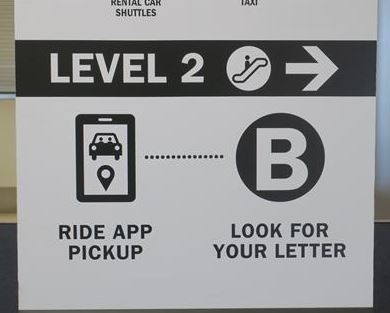
It wasn’t that long ago that airports across the country were struggling with how to regulate ride-hailing companies such as Uber and Lyft that were providing taxi-like pick-up and drop-off rides at terminals but, unlike taxis, were operating without permits.
Some airports imposed all-out bans; others sued the ride-hailing companies, issued cease and desist orders, or issued tickets with large fines to app-hailed drivers venturing onto airport property.
Today, most airports have deals in place with one or more ride-hailing companies. However, in the race to begin working relationships, airports across the country adopted different terms and a wide variety of signs and icons to point passengers to their app-hailed rides. That causes confusion for both travelers and drivers and adds to the curbside congestion at many airports.

A new airport ride-hailing icon recently adopted by Los Angeles International and, soon, by many other airports, should help solve the problem.
The term is “Ride App Pickup.” And the icon, or pictogram, is a smartphone symbol containing a mapping pin and car with two riders.
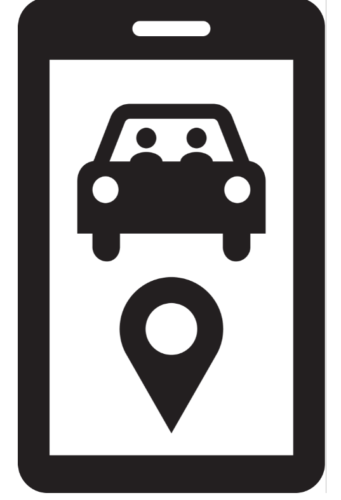
Many signs and symbols at airports are standardized and federally-mandated. But like the symbol for pet-relief areas now familiar at many airports, the symbol for ride-app gathering areas is not.
“After a long trip, the last thing a traveler needs is confusion as to where they need to go to catch a ride or meet their Uber or Lyft driver,” said Keith Wilschetz, Deputy Executive Director for Operations and Emergency Management at Los Angeles World Airports.
To gain some industry consensus about at the airport ride hailing locations, the American Association of Airport Executives (AAAE) put together a working group of more than a dozen U.S. airports and several ride-hailing service providers. “Symbol guru” Mies Hora, founder and president of Ultimate Symbol, was then hired to help create a well-designed, common ride-hailing sign for airports to use.
“Needs like this are arising at airports all the time, but there hasn’t been a central way to develop the best symbol,” said Hora, “This was done the right way: they hired me – an expert in symbols – and I was able to create both the nomenclature and the symbol sign that will now be used to create consistency for this service across the U.S. and in other countries.”
If widely adopted as expected, “That standardization of terms and icons for ride app services promises to more seamlessly connect passengers and drivers at LAX and other airports across the country,” said Jared Pierce, Director of AAAE Services.
Meditating on an icon for airport yoga rooms
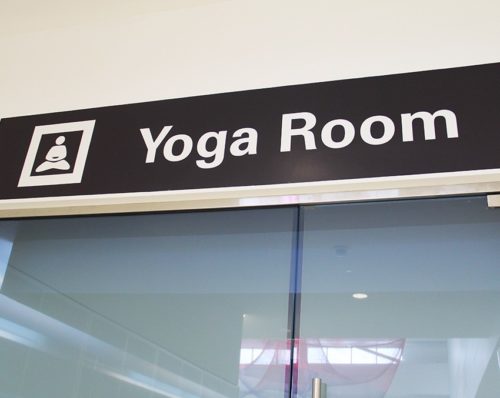
When San Francisco International Airport introduced the first yoga room in an airport, it called on the team at Gensler, the architecture firm that reimagined and redesigned much of SFO and other airports, to come up with an icon to let passengers know the new space was there.
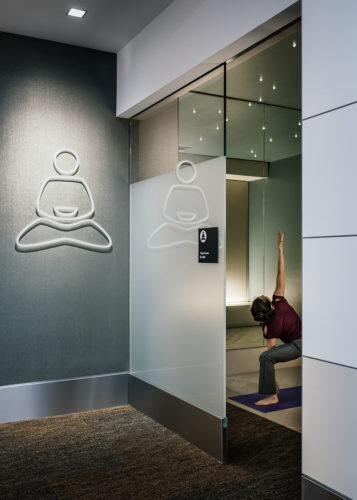
“We started with SFO’s existing symbol system and brainstormed ideas that would be simple, elegant and easily recognizable,” said Tom Horton, a Gensler senior associate on the team that works with SFO, “There are lots of symbols giving you a warning or telling you things you can’t do; we wanted to create a symbol that is calming and welcoming.”
The pictogram SFO settled on depicts a familiar yoga pose and guides passengers to the airport’s two yoga rooms. And while Dallas/Fort Worth International Airport and Chicago’s O’Hare and Midway Airports have so far adopted different signs and symbols to lead passengers to their yoga rooms, SFO’s yoga room pictogram is likely to become the standard for this much-appreciated airport amenity.
In progress: an icon for all-gender restrooms
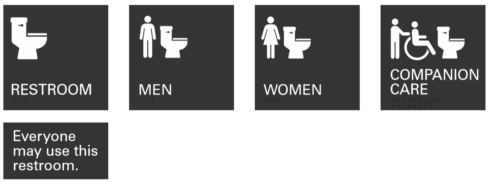
Family and all-gender, single-stall restrooms, with corresponding signs, are becoming standard at many airports. But the Gensler team is now developing a symbol for the all-gender, multi-stall restrooms that will become standard, by law, at SFO and other public buildings in the City and County of San Francisco.
The traditional ‘men’ and ‘women’ icons on restroom signs are easily recognizable. But for ‘all-gender’ restrooms, which will have community sink areas and multiple stalls with floor to ceiling partitions, a gendered symbol won’t be appropriate.
Gensler’s icon, still in the testing phases at SFO, is “straightforward, and speaks to exactly what you’ll find in the restroom – a toilet,” said Gensler’s Tom Horton. “The rational was to take any type of cultural contention out of the symbol, strip it back, and make it just about the fixtures in the room.”
Fun with signs
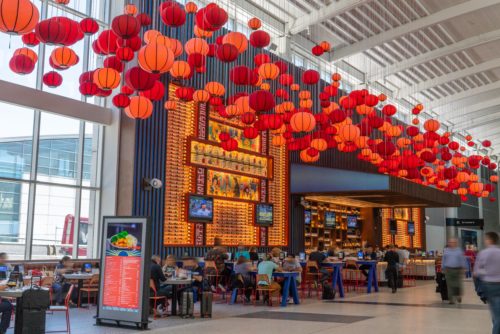
Of course, there’s are lots of other reasons – and ways – to use signs and symbols at airports. Some of those can not only provide information, they can also be fun.
In OTG’s United Terminal at Houston’s George Bush Intercontinental Airport, the new Yume restaurant featuring a ramen bar, sushi exhibition kitchen, Asian bakery and Asian biergarten is ‘signed’ with hundreds of red lanterns and 84 waving maneki-neko “lucky cats.”
This cuts through the visual ‘noise’ at the airport and signals that something different is happening here,” said Eric Brinker, OTG’s Vice President of Experience.
And at OTG’s Global Bazaar areas in Newark Liberty International Airport, several food stands are equipped with signs that flip and change at 11 a.m. each morning.
“The idea of having ribs or burgers at 5 A.M. is not really appealing,” said Brinker, so OTG worked with architecture and design firm Rockwell Group to create spaces that house one restaurant in the morning and another later in the day.
“For example, Eggy Weggy becomes Custom Burger at the switch-over,” said Brinker, “The back of the house is the same but the front of the house transforms, like a Broadway set, with flipping signs that are not only efficient but very Instagram-worthy.”
Are there some airport signs you love – or hate? Share you comments – and pictures, if you have them, in the comments section.